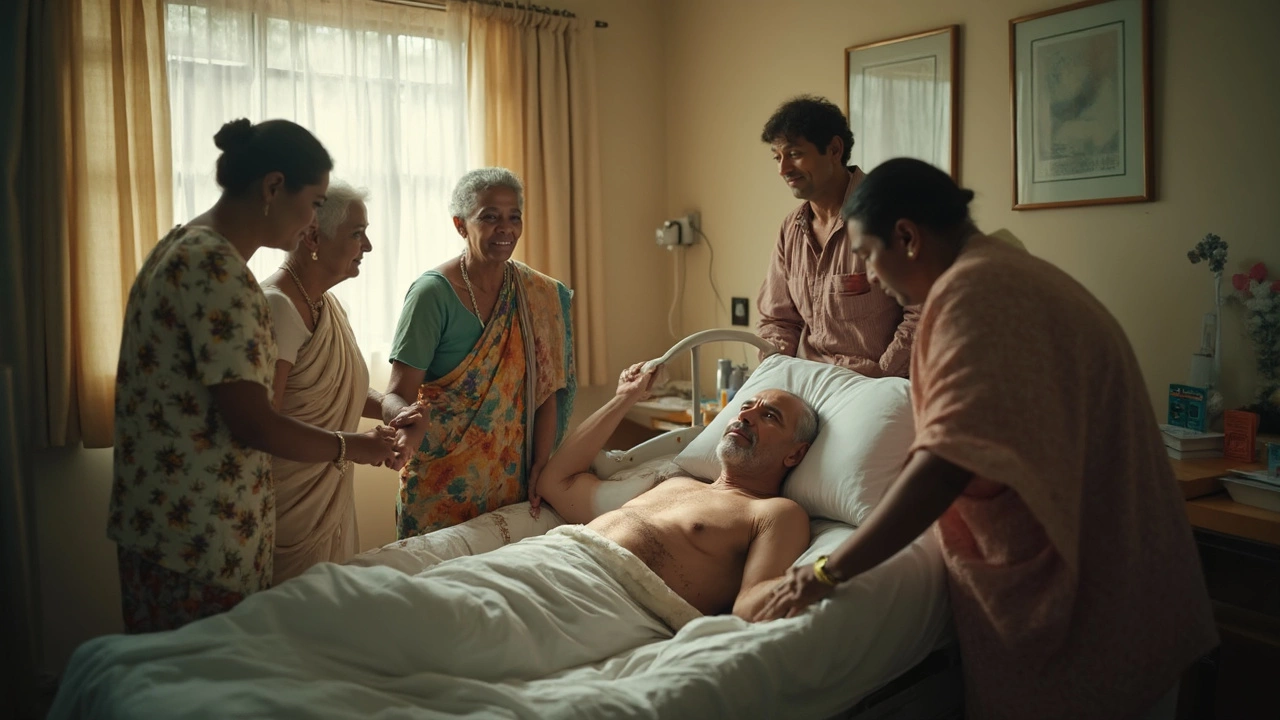If you ask anyone who's been through heart surgery, they'll tell you—recovery is no small thing. But not all heart surgeries are the same when it comes to bouncing back. Some are just plain brutal, both on your body and your mind. And if there's one that stands out, it's the heart transplant. That’s the one most surgeons and nurses will quietly agree is the toughest to recover from.
Imagine your old heart has given out, and doctors take out your beating heart and swap in a new one from someone else. It sounds straight out of a sci-fi movie, but for lots of people each year, it’s the only shot at still being around for birthdays and vacations with the family. The thing is, it’s just the start of a long, rocky road. Recovery isn’t just about the stitches healing. It’s about your whole body trying to accept the new organ, heavy duty meds, exhaustion that knocks the wind out of you, and worries that never really go away.
If you—or someone close—is facing heart surgery, you’re probably wondering: how painful is this, really? How long does it take before things feel normal? The answers aren’t always what you hope for, but knowing what you’re up against can help you get ready, both physically and mentally. Get ready to learn exactly why heart transplant recovery is known for being the hardest—and what you can do to make it more bearable.
- Why Heart Surgery Recovery Hits Hard
- What Makes Certain Surgeries More Difficult?
- Stories and Struggles: Life After Heart Transplants
- Tips to Make Recovery Smoother
Why Heart Surgery Recovery Hits Hard
Any kind of heart surgery throws your whole system for a loop. Your chest is literally opened up; some folks say it feels like getting hit by a truck once the anesthesia wears off. That’s not an exaggeration. You’re dealing with a big wound, chest soreness, breathing trouble, and just getting up hurts like crazy for a while.
But the pain and physical healing are just the start. Your heart doesn’t mess around—a surgery on it shakes up your whole body. You lose muscle fast from lying in the hospital bed, and it takes real effort to build it back. People are weak, winded, and moving around can seem almost impossible in the first days.
It’s not just your muscles that need a reboot. After big cardiac surgery, your immune system gets slammed. Your body now sees part of you—the new heart in a transplant—as a stranger. That’s why patients have to take strong meds (immunosuppressants), which come with their own issues: feeling sick, higher risk of infection, and side effects you can’t just ignore.
Here’s a look at what’s going on after a major procedure:
- Deep chest pain that lingers
- Weakness from being off your feet
- Breathing feels tougher for weeks
- Medications mess with your stomach and energy
- Sleep turns weird—you’re tired but restless
- Risk of infection is way up
Want some numbers? Doctors say around 25-30% of heart surgery patients end up back in the hospital within the first month, often for issues like infection or fluid around the heart. Many patients are surprised by how tired, moody, or even down they feel once they’re back home. Mental stress plus physical stress just hit differently after anything to do with your heart.
All these hurdles are what make recovery as tough as the surgery itself. Knowing this from the start helps you understand why taking it slow and following rehab instructions is so important. Just walking to the bathroom feels like a marathon at first—but every bit of progress counts.
What Makes Certain Surgeries More Difficult?
Not every heart surgery feels the same—for the patient or the surgeon. Some are quick fixes, like stents or basic valve repairs. But when it comes to a hardest surgery like a heart transplant, things get complicated fast. So, what’s behind all that extra struggle?
First, it’s all about how intense the surgery is. A cardiac surgery like a transplant takes hours and usually means your body is supported by machines the whole time. You don’t just heal from a cut—you heal from your entire chest being opened, ribs spread, old heart taken out, and new heart sewn in. Sounds wild, right? It actually is.
Next comes the stuff you don’t see. Here’s a breakdown of why some surgeries knock you down harder than others:
- Longer operation times: The longer you’re under, the more stress your body faces. For complex procedures, it’s common to spend over 6 hours in the OR.
- Big trauma to the body: Heart transplants and some other major severe cardiac surgeries literally change the way your heart pumps. The trauma and inflammation make recovery heavier and longer.
- Serious meds after surgery: Patients need strong immune-suppressing drugs so the body doesn’t reject the new heart. These drugs make you feel wiped out and raise your risk for infections. Staying healthy becomes a full-time job.
- Risk of complications: Heart transplant recovery comes with big risks—rejection, infections, and even kidney problems from all the meds. More complications mean more time stuck in the hospital or rehab, not back at home.
- Emotional drain: The mental side hits hard. Living with a new heart can bring anxiety, fear of rejection, or depression, which slows down recovery even more.
Check out how recovery times can look for different heart surgery types:
| Surgery Type | Average Hospital Stay | Typical Full Recovery Time |
|---|---|---|
| Balloon Angioplasty | 1-2 days | 1-2 weeks |
| Coronary Bypass | 5-7 days | 6-12 weeks |
| Valve Replacement | 5-7 days | 2-3 months |
| Heart Transplant | 2-4 weeks | 6 months—1 year |
So if you ever wonder why someone takes months to bounce back after a heart transplant, it’s not just the surgery itself. It’s everything else your body and mind have to handle, from serious meds to lifelong lifestyle changes. That combo is what makes heart surgery recovery so uniquely tough for some people.

Stories and Struggles: Life After Heart Transplants
Once the big day is over and doctors stitch you up, the real work begins. Heart transplant recovery isn’t just about sitting in a hospital bed—it’s a roller coaster, and no two stories are the same. Most folks spend two to three weeks in the hospital after surgery, but some stay even longer if there are complications. One of the biggest issues is your immune system. Because your body will see that new heart as an invader, you need powerful drugs called immunosuppressants to stop your body from attacking it.
Taking these meds every day is a non-negotiable part of life now. They do a good job at protecting the heart surgery you just had, but they come with side effects—think infections, weight gain, kidney trouble, and even a higher risk for certain cancers. Plus, you’ve got to show up for clinic visits all the time, especially in the first year. Some patients need heart biopsies every month at the start to check for signs of rejection, which sounds like a hassle, but it’s the safest way to spot problems early.
If you want to see the numbers, here’s a little snapshot of what most people face as they get their life back on track after a heart transplant:
| Milestone | Typical Timeframe |
|---|---|
| Leaving Intensive Care Unit (ICU) | 3-7 days after surgery |
| Walking short distances | 1-2 weeks after surgery |
| First hospital discharge | 2-3 weeks after surgery |
| Driving again | 6-8 weeks after surgery |
| Returning to work | 3-6 months after surgery |
Beyond the numbers, there’s a mental and emotional side. Lots of transplant survivors talk about feeling grateful but also anxious. You’ve gone from barely hanging on to hoping everything goes smoothly. There are stories of people dealing with "survivor’s guilt" or feeling weird getting used to a heartbeat that’s not their old one. Everyday stuff—like catching a cold—suddenly feels like a big deal, because your immune system just isn’t what it used to be.
Family and friends make a huge difference. Having someone to drive you to appointments, remember your medicine schedule, or cook meals you can stomach can turn mountains back into molehills. Support groups, both online and in-person, are packed with people swapping tips, venting about struggles, and celebrating the small wins—like making it through your first hike or getting the all-clear on a biopsy.
It’s not all doom and gloom, though. With advances in cardiac surgery and new meds, the one-year survival rate after a heart transplant is now around 90%. People go back to work, play sports, even travel. But every day is about staying sharp and not getting complacent. Follow-up care is forever, but so is the chance to make new memories.
Tips to Make Recovery Smoother
Getting through the toughest heart surgery recovery isn’t about just waiting for wounds to close up. There’s real work—both for your body and your daily routine. After a cardiac surgery like a transplant or an open-heart operation, it can feel like your batteries are totally drained. But there are ways to make things a little easier.
- Stick to Your Meds: Don’t mess around with your medication. Especially after a heart transplant, those anti-rejection drugs are non-negotiable. Missing even a single dose can cause big trouble, like your body starting to fight the new heart.
- Walk, Don’t Run: Light walking gets the blood moving and lowers the risk of clots. Most doctors say you should be moving as soon as you’re steady, even if it’s just around the living room or hallway. If you feel dizzy, stop. Slow and steady wins here.
- Follow Up Like Clockwork: All those follow-up appointments matter. Doctors check for signs of infection, organ rejection, or trouble with your stitches. They often do blood tests to fine-tune your meds, so don’t blow off those dates—even if you feel okay.
- Eat for Your Heart: A good recovery diet is loaded with fresh fruits, veggies, and lean protein. Ditch salty snacks, junk food, and anything deep-fried. Stick with what the heart docs recommend—less salt, more nutrients, and plenty of water.
- Ask for Help: You can’t do it all. Family, friends, or even neighbors can step in for shopping, chores, or rides to the doctor. Don’t be shy—people want to help, and you’ll recover better if you’re honest about your limits.
To show how real these struggles are, check out this quick breakdown of average recovery times for major heart surgery types:
| Type of Surgery | Hospital Stay (Days) | Full Recovery (Months) |
|---|---|---|
| Heart Transplant | 14-21 | 3-12 |
| Coronary Bypass | 5-10 | 2-6 |
| Valve Replacement | 5-7 | 2-4 |
Another tip that’s super underrated—mental health. Anxiety and sadness are common after cardiac surgery. If you’re struggling, talk to your doc or reach out to a support group. Taking care of your mind is just as key as looking after your new heart.
